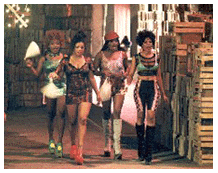...Best of Sicily
presents... Best of Sicily Magazine. ... Dedicated to Sicilian art, culture, history, people, places and all things Sicilian. |
by Mauro Azzolini | ||
Magazine Best of Sicily Arts & Culture Fashion Food & Wine History & Culture About Us Travel Faqs Contact Map of Sicily |
Sud Side Story, her work with Neapolitan Mario Merola and a unique (though not professional) international cast, is different. Set in Palermo, the film is the story of Romeo and Juliet retold with Nigerian immigrants as the protagonists. Its "Romeo" is an unemployed Italian in Palermo's Capo district, in the old part of the city, while "Juliet" is a Nigerian prostitute who lives in the same neighbourhood. It's a musical, and West Side Story naturally comes to mind, but this time Romeo is Tony (played by Bobo Rondelli), a Sicilian who lives with his three overbearing aunts in a tiny part of Sicily geographically near, but yet far away from, the main tourist circuit of European cities. The story does not seek to conceal the contradictions of impossible integration, behind whose facade the concrete realities remain distinctly black and white. It is a subtle war between cultures and identity, between a black saint and a Sicilian symbol. Gino De Crescenzo's captivating music evokes every street, every corner, of Palermo's depressed neighborhoods. In an interesting departure from literary tradition, the "Romeo" character is called Giulietto (Jules) and the female lead, "Juliet," is called Romea. The movie's bright colors leave an impression of Africa, but Roberta Torre hasn't forgotten about Sicily. Angelo, another film set in Palermo, produced by Rita Rusic, is in the works. Stay tuned. About the Author: Mauro Azzolini has written for Occhio di Bue and other magazines. | |
Top of Page |
 Shakespeare has landed in Sicily, this time in the guise of Roberta Torre. Milanese by birth but Palermitan by
affinity, producer and director Torre recently unveiled South Side Story
(Sud Side Story) at the Venice Film Festival and the movie is now in general
release in Italy. Three years ago, Torre broke new ground with Tano da
Morire, the first musical about the Mafia. Tano, which also took place
in Palermo, was a parody of the Mafioso lifestyle and lowbrow Sicilian attitudes.
Shakespeare has landed in Sicily, this time in the guise of Roberta Torre. Milanese by birth but Palermitan by
affinity, producer and director Torre recently unveiled South Side Story
(Sud Side Story) at the Venice Film Festival and the movie is now in general
release in Italy. Three years ago, Torre broke new ground with Tano da
Morire, the first musical about the Mafia. Tano, which also took place
in Palermo, was a parody of the Mafioso lifestyle and lowbrow Sicilian attitudes. there are also clear allusions
to certain Indian musicals. South Side Story was not an easy film to make.
Torre had to face a thousand unforeseen difficulties. Everything could have
been simpler with professional actors. But that would have resulted in a
different film. The director sought out the African girls at night, while
they were on the streets working. One of the Nigerian women deported during
the filming ad-libbed a quasi ritual dance around a passport. In the end,
however, it was precisely these difficulties that allowed Torre to better
understand humanity through these girls. Clearly, she has not renounced
her background as a maker of documentary films. Her refreshing inclination
for cinematic experimentation is undiminished.
there are also clear allusions
to certain Indian musicals. South Side Story was not an easy film to make.
Torre had to face a thousand unforeseen difficulties. Everything could have
been simpler with professional actors. But that would have resulted in a
different film. The director sought out the African girls at night, while
they were on the streets working. One of the Nigerian women deported during
the filming ad-libbed a quasi ritual dance around a passport. In the end,
however, it was precisely these difficulties that allowed Torre to better
understand humanity through these girls. Clearly, she has not renounced
her background as a maker of documentary films. Her refreshing inclination
for cinematic experimentation is undiminished.